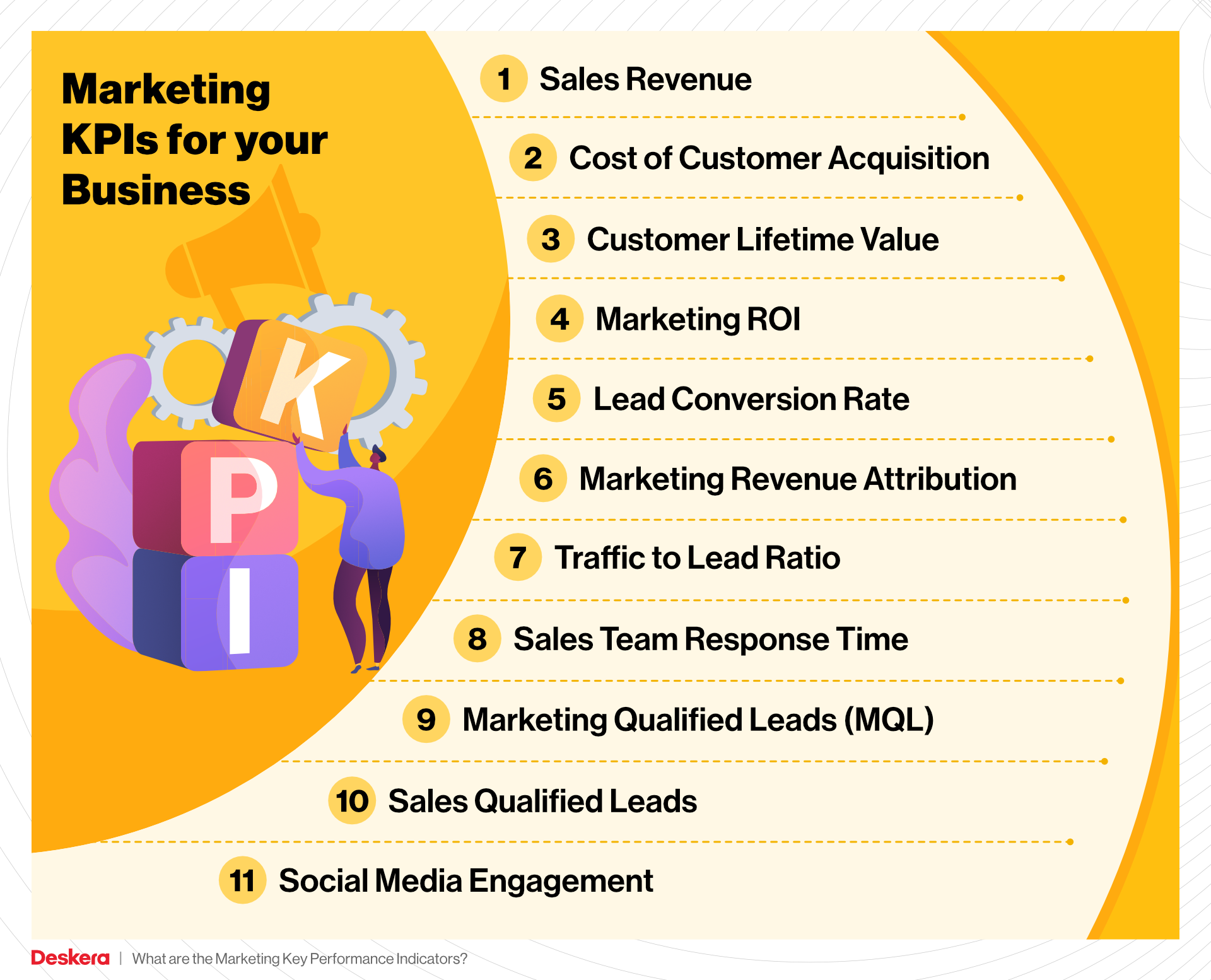Have you ever thought about how you can measure the marketing efforts of your company? Well, the answer is simple, through metrics! But what kind of metrics are required to evaluate the success of marketing efforts? Marketing key performance indicators help in understanding what’s working for your company and what’s not. Read this blog and know more about these key performance indicators.
What are Key Performance Indicators?
Key performance indicators or KPIs refer to the metrics that help in tracking the overall effectiveness of the marketing and sales efforts of your business.
One of the main advantages of KPIs is that you can configure them according to the needs of your business and individual teams. These indicators help to analyze what strategies are working for you and which aren’t.
Marketing key performance indicators are numerical metrics that are used by a company in order to track the progress of its marketing goals.
Marketing KPIs for your Business

Let’s take a look at some of the marketing KPIs for your business:
Sales Revenue
Sales revenue is an important metric that can help to track the progress of your marketing campaign. Make sure the sales revenue exceeds the expenses that incur. This KPI helps to predict the growth trends and projections that incur through your business. Sales revenue not only helps in predicting the overall success of a business but also helps in achieving personalized goals for the team.
When you identify KPIs related to sales and marketing techniques, you will be able to determine the ROI generated by these departments.
Cost of Customer Acquisitions
This refers to the cost of acquiring a customer. It is basically the cost associated with convincing the prospective customer in order to buy your company’s product or service. This is an essential metric as it helps you make important budgetary decisions.
For example, you won’t like to spend too much money in acquiring a customer if it is not resulting in a profit. This way it gets easier to comprehend how much money is required to spend on attracting customers.
Customer Lifetime Value
The lifetime value of a customer determines the total amount of revenue a business can expect from a single customer over the average lifespan. This metric indicates the net revenue a customer can bring into a company throughout their partnership.
Lifetime Value of Customer = Average Lifetime of a Customer * Average Purchase Amount * Average Number of Purchases in a Year
Average Lifetime = The duration of the customer-company relationship
Average Purchase Amount = The average amount they spend
Average Number of Purchases = The number of purchases with a year
For example, if a customer makes an average purchase of $100 twice a year for a period of 10 years, then their LTV will be
LTV=10 X $100 *2= $2000
Thus, LTV is an important parameter that can help to gauge the ROI of your company.
Marketing ROI
Return on Investment refers to the amount of money you earn as compared to the marketing cost. If you want to calculate this ROI, you will have to subtract marketing expenses from sales growth. Once this is done, you will have to divide the result by marketing cost to get a return on investment.
Please note that it can be difficult to attribute sales growth directly to a marketing campaign.
Organic Traffic
Organic traffic refers to the traffic on your website that is caused due to search engines such as Google, Bing, etc. As organic traffic is related to your SEO strategy, it helps to gauge the success of your SEO efforts. Make sure every page of your website has a targeted keyword, and the content is well-optimized.
Google Analytics is a popular tool that can help you to calculate organic traffic.
Lead Conversion Rate
The lead conversion rate refers to the percentage of visitors who land at your website and get converted into leads. It helps to determine how the sales campaign is performing and what campaign can positively affect your company’s ROI.
Lead conversion rate= No. of leads converted in a specified time period/the number of leads created in the same period X 100
For example, if 50 leads were created in February, and 10 leads were converted to opportunities, then the lead conversion rate = (10/50) X 100= 20%.
Marketing Revenue Attribution
Understanding how much revenue can be attributed to marketing can prove to be beneficial in knowing the effectiveness of your marketing campaigns.
There are two types of marketing attribution models, single-touch attribution model or multi-touch attribution model.
Traffic to Lead Ratio
It is very important to understand that where your traffic is coming from; organic, direct, social media, or referrals. In cases where your traffic is constant or growing, but your traffic to lead ratio is declining, then it means that something is not right. This can happen due to misalignment between the information shown to the users and what they thought they were clicking on.
When you regulate your traffic to lead ratio, it helps to determine whether it’s time to change your website copy, design, CTA, or not.
Sales Team Response Time
According to research, it has been found that B2B leads receive slow responses from sales teams. This happens because the quality of a lead decreases with time.
Based on research, it has been found that the chances of making a successful contact are 100 times more when a contact attempt is made within 5 minutes as compared to 30 minutes after lead submission.
So, it is important to evaluate how fast can your sales team respond to leads, in comparison with your competitors? This metric can thus help to understand the success of your marketing campaign.
Marketing Qualified Leads (MQL)
An MQL is a lead that has shown interest in what a brand has to offer based on the marketing efforts. This type of lead intentionally engages with the brand by performing various actions such as submitting contact information, adding items to a shopping cart, downloading trial software, etc.
This KPI helps your marketing team understands the number of leads they are bringing in.
Sales Qualified Leads
If your MQL is nurtured in the right way, then it becomes a sale qualified lead. Sales Qualified Lead refers to the leads that are considered to be sales-ready based on their lead score. These leads have been researched well and vetted by the marketing department.
Social Media Engagement
One of the most important parts of marketing is social media which is also the best way to engage your audience. You can easily track likes, shares, and comments on social media platforms.
Measuring engagement is the best way to analyze the success of your social media posts. There are innumerable social media KPIs that you can track. These KPIs help to predict how well your content and brand resonates with the audience on that platform.
How to choose the best marketing KPI for your business?
With a plethora of marketing KPIs available these days, it is important to choose the one that suits your business requirements. Tracking wrong KPIs won’t yield correct results and would waste your precious time. That is why it is crucial to choose the right marketing KPI.
If you want to pick the right KPI, then you will have to answer various questions such as ‘What does your business aim at? What are your goals and objectives?’ The marketing KPI should be relevant to your business goals and align with your growth stage. It should be quantifiable, measurable, and actionable.
How Deskera Can Assist You?
Whether you are a sales manager or running your own business, there are tons of duties and responsibilities that you have to fulfill. Using the Deskera CRM system, you can manage your contacts, leads and sales deals. You can use the CRM system to manage all customer data and manage your leads, sales negotiations and deals.
Doing so will help you to save the time taken in transferring customer data between the different systems. Having a good CRM system will help you manage your financial and sales reports and be prepared to kick-off your meetings.
Deskera can also assist you with real-time updates about your business like cash flow status, customer satisfaction, inventory management, sales, purchases, purchase orders, customer tickets, customer satisfaction, managing leads, revenues, profit, and loss statements, and balance sheets.
Moreover, it would also help in integrating sales methodology across different platforms onto one system so that you have a consolidated list for email campaigns, leads management, and sales pipeline to mention a few.
It will also help you to sync between your orders, payments, taxes, refunds, product variants, sending out invoices and reminders, facilitating invoice management, and even undertaking follow-ups and advertisement campaigns.
Such a consolidated platform will help you to improve your sales through building effective sales compensation plans and also facilitate faster and well-informed decision-making. It will help you in strengthening your opportunities and being braced for the threats.
Deskera books and Deskera CRM will also be able to ensure the highest customer satisfaction and thereby an increase in net revenues and net profits.
Key Takeaways
- Key performance indicators or KPIs refer to the metrics that help in tracking the overall effectiveness of the marketing and sales efforts of your business
- Marketing key performance indicators are numerical metrics that are used by a company in order to track the progress of its marketing goals
- There are various marketing KPIs that can help to evaluate the success of the marketing campaigns
- Sales revenue is an important metric that can help to track the progress of your marketing campaign
- Cost of customer acquisition refers to the cost of acquiring a customer
- The lifetime value of a customer determines the total amount of revenue a business can expect from a single customer over the average lifespan
- Return on Investment refers to the amount of money you earn as compared to the marketing cost
- Organic traffic refers to the traffic on your website that is caused due to search engines such as Google, Bing, etc
- The lead conversion rate refers to the percentage of visitors who visit your website and get converted into leads
- Understanding how much revenue can be attributed to marketing can prove to be beneficial in knowing the effectiveness of your marketing campaigns
- It is very important to understand that where your traffic is coming from; organic, direct, social media, or referrals
- Sales response time is an important parameter that can help to predict the success of your marketing efforts
- An MQL is a lead that has shown interest in what a brand has to offer based on the marketing efforts
- If your MQL is nurtured in the right way, then it becomes a sale qualified lead. Sales Qualified Lead refers to the leads that are considered to be sales-ready based on their lead score
- Measuring social media engagement is the best way to analyze the success of your social media posts
- With a plethora of marketing KPIs available these days, it is important to choose the one that suits your business requirements
- The marketing KPI should be relevant to your business goals and align with your growth stage. It should be quantifiable, measurable, and actionable
Related Articles












